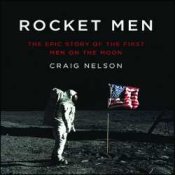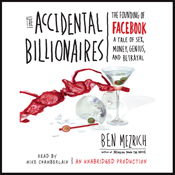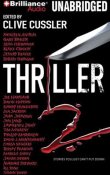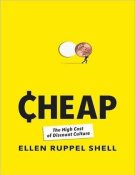August
2009
AUDIO BOOK REVIEWS
by Jonathan Lowe
 Buzz Aldrin relates his own personal experience
of the first moon landing of Apollo 11
in MAGNIFICENT DESOLATION, an audiobook
co-written with Ken Abraham, and narrated
by Patrick Egan, chosen for his no-nonsense
delivery (since the book is told first
person.) The first two CDs chronicle the
mission itself, from launch to touchdown
and back, leaving little out that one
might want to know about the mechanics
of what actually happened. It's the kind
of account you might pay to hear in an
auditorium, and not regretting afterward
the price of admission. Included here
are reactions to the tense moments when
everything has to work precisely or else.
Like when they arrived, and Neil drifted
over acres of boulders looking for a good
spot to put down, and then were forced
to land within thirty seconds or run out
of fuel and crash. Or when Buzz used his
pen to unstick a faulty switch prior to
liftoff from the moon. You wonder what
that must have been like, for sure—knowing
that if the engine doesn't fire, there
would be no rescue, just a short wait
until air runs out as you stare across
what Buzz described as "magnificent desolation"
toward a distant, blue Earth. After the
first two CDs, then the audiobook slows
down, and the remaining narrative branches
out from the actual feat accomplished
to reveal (in depth) what Aldrin and his
fellow astronauts faced, coming home:
the hordes of journalists that awaited
them to emerge from quarantine. The endless
parades in New York, Chicago, and around
the world. How it all began to seem as
though they were puppets on display for
NASA's public relations department. The
alcohol and depression that this led to,
in Aldrin's case. And how he coped. Finally,
there is reflection on what it all meant,
and what it means today. Aldrin admits
that not much space science was achieved
by Apollo 11, and although the missions
that followed to the moon had more science,
they also got far less press. Should we
go to Mars, and what is the cost of going
or not going, considering that engineering
science would no doubt benefit? The book
attempts to give a big picture to all
these subjects, yet asks more questions
than it answers. But that's okay. It's
honest and gutsy. . . although, granted,
40 years have elapsed. Egan, as a narrator,
disappears as he should, and if you didn't
know Aldrin's voice you'd believe it was
him speaking: an engineer, weary yet optimistic,
eyes open to the moment, yet seeing beyond
his own horizon. (Random House Audio;
13 hours unabridged)
Buzz Aldrin relates his own personal experience
of the first moon landing of Apollo 11
in MAGNIFICENT DESOLATION, an audiobook
co-written with Ken Abraham, and narrated
by Patrick Egan, chosen for his no-nonsense
delivery (since the book is told first
person.) The first two CDs chronicle the
mission itself, from launch to touchdown
and back, leaving little out that one
might want to know about the mechanics
of what actually happened. It's the kind
of account you might pay to hear in an
auditorium, and not regretting afterward
the price of admission. Included here
are reactions to the tense moments when
everything has to work precisely or else.
Like when they arrived, and Neil drifted
over acres of boulders looking for a good
spot to put down, and then were forced
to land within thirty seconds or run out
of fuel and crash. Or when Buzz used his
pen to unstick a faulty switch prior to
liftoff from the moon. You wonder what
that must have been like, for sure—knowing
that if the engine doesn't fire, there
would be no rescue, just a short wait
until air runs out as you stare across
what Buzz described as "magnificent desolation"
toward a distant, blue Earth. After the
first two CDs, then the audiobook slows
down, and the remaining narrative branches
out from the actual feat accomplished
to reveal (in depth) what Aldrin and his
fellow astronauts faced, coming home:
the hordes of journalists that awaited
them to emerge from quarantine. The endless
parades in New York, Chicago, and around
the world. How it all began to seem as
though they were puppets on display for
NASA's public relations department. The
alcohol and depression that this led to,
in Aldrin's case. And how he coped. Finally,
there is reflection on what it all meant,
and what it means today. Aldrin admits
that not much space science was achieved
by Apollo 11, and although the missions
that followed to the moon had more science,
they also got far less press. Should we
go to Mars, and what is the cost of going
or not going, considering that engineering
science would no doubt benefit? The book
attempts to give a big picture to all
these subjects, yet asks more questions
than it answers. But that's okay. It's
honest and gutsy. . . although, granted,
40 years have elapsed. Egan, as a narrator,
disappears as he should, and if you didn't
know Aldrin's voice you'd believe it was
him speaking: an engineer, weary yet optimistic,
eyes open to the moment, yet seeing beyond
his own horizon. (Random House Audio;
13 hours unabridged) |
 Another chronicle of how the moon landing
happened, (as well as an examination of
what the country was like at the time,
for those too young to remember). can
be found in ROCKET MEN by Craig Nelson,
a look behind the scenes at NASA, and
into the living rooms of all the astronauts
involved. The "one small step" that Neil
Armstrong took was also the giant leap
for mankind that President Kennedy envisioned,
and although (as stated above) not much
in the way of space exploration was achieved
by the mission, it did pull together the
country (and the engineers) to accomplish
a monumental technical and political goal.
A former editor and winner of the Henry
Adams prize for his book
Thomas Paine, Nelson is rigorous
in his research, methodically examining
the Cold War space race while uncovering
all the minutia that went unnoticed by
the press. Narrator Richard McGonagle
is a good choice to read the chronology,
replete with its many interesting anecdotes,
since his masculine voice would also be
ideal for a sports biography. Essentially,
that's really what this was: a touchdown
on the moon. No one really cared about
the moon landings that followed, as most
Americans were too busy watching ball
games on TV. Buzz Aldrin's story, being
part of this history making event, gets
told too, although Aldrin's own full biography
is obviously more detailed in that regard.
(Penguin Audio; 17 hours unabridged)
Another chronicle of how the moon landing
happened, (as well as an examination of
what the country was like at the time,
for those too young to remember). can
be found in ROCKET MEN by Craig Nelson,
a look behind the scenes at NASA, and
into the living rooms of all the astronauts
involved. The "one small step" that Neil
Armstrong took was also the giant leap
for mankind that President Kennedy envisioned,
and although (as stated above) not much
in the way of space exploration was achieved
by the mission, it did pull together the
country (and the engineers) to accomplish
a monumental technical and political goal.
A former editor and winner of the Henry
Adams prize for his book
Thomas Paine, Nelson is rigorous
in his research, methodically examining
the Cold War space race while uncovering
all the minutia that went unnoticed by
the press. Narrator Richard McGonagle
is a good choice to read the chronology,
replete with its many interesting anecdotes,
since his masculine voice would also be
ideal for a sports biography. Essentially,
that's really what this was: a touchdown
on the moon. No one really cared about
the moon landings that followed, as most
Americans were too busy watching ball
games on TV. Buzz Aldrin's story, being
part of this history making event, gets
told too, although Aldrin's own full biography
is obviously more detailed in that regard.
(Penguin Audio; 17 hours unabridged) |
 Next, it makes sense that two lonely geeks
at Harvard with an interest in girls would
be the founders of Facebook, the upscale
social mega website (whose less upscale
rival, MySpace, has animated ads featuring
young girls staring alluringly into computer
screens, hoping to score the most credit
card numbers.) In THE ACCIDENTAL BILLIONAIRES,
Ben Mezrich (the gambling author of
Bringing Down the House) chronicles
how a couple of rowing jocks with an idea
to meet the babes of Harvard online defer
to a computer geek named Mark Zuckerberg,
who in turn develops his own framework
for something more than the jocks, called
"The Harvard Connection." Mark, prior
to meeting them circa 2003, had hacked
the university's computers as a crank,
collected women student photos, and started
up a crank website he called Facemash.
before being forced to shut it down. So
the jocks needed the geek to write code
for them. What happens next is detailed
in the subtitle for the book—sex,
money, genius, and betrayal. The story
is told chronologically, with enough anecdotes
to keep the somewhat imagined narrative
moving, using creative hypotheses to reconstruct
Zuckerberg's thoughts and actions, given
statements from Mark's one-time partner
and friend, Eduardo Saverin. (Incidentally,
the university's hacked student database
was called Facebook, the very name Mark
eventually adopted as Facebook.com, with
the idea of creating an actual interactive
social destination like those from which
he'd been denied entry.) The book is narrated
by Mike Chamberlain, a stage and voiceover
actor. Obviously it is not the full story,
since Zuckerberg refused to cooperate
with interviews for the book, but if you
like your fiction with more than a grain
of truth behind it, you could do worse.
(Random House Audio; 7 1/2 hours unabridged)
Next, it makes sense that two lonely geeks
at Harvard with an interest in girls would
be the founders of Facebook, the upscale
social mega website (whose less upscale
rival, MySpace, has animated ads featuring
young girls staring alluringly into computer
screens, hoping to score the most credit
card numbers.) In THE ACCIDENTAL BILLIONAIRES,
Ben Mezrich (the gambling author of
Bringing Down the House) chronicles
how a couple of rowing jocks with an idea
to meet the babes of Harvard online defer
to a computer geek named Mark Zuckerberg,
who in turn develops his own framework
for something more than the jocks, called
"The Harvard Connection." Mark, prior
to meeting them circa 2003, had hacked
the university's computers as a crank,
collected women student photos, and started
up a crank website he called Facemash.
before being forced to shut it down. So
the jocks needed the geek to write code
for them. What happens next is detailed
in the subtitle for the book—sex,
money, genius, and betrayal. The story
is told chronologically, with enough anecdotes
to keep the somewhat imagined narrative
moving, using creative hypotheses to reconstruct
Zuckerberg's thoughts and actions, given
statements from Mark's one-time partner
and friend, Eduardo Saverin. (Incidentally,
the university's hacked student database
was called Facebook, the very name Mark
eventually adopted as Facebook.com, with
the idea of creating an actual interactive
social destination like those from which
he'd been denied entry.) The book is narrated
by Mike Chamberlain, a stage and voiceover
actor. Obviously it is not the full story,
since Zuckerberg refused to cooperate
with interviews for the book, but if you
like your fiction with more than a grain
of truth behind it, you could do worse.
(Random House Audio; 7 1/2 hours unabridged) |
 Next, Clive Cussler takes the helm from
James Patterson for a new compilation
of suspense stories called THRILLER 2.
The choices are marked more by subtlety
than mere shock or bloodletting, as eleven
narrators deliver short fiction by twenty-three
authors, including Jeffrey Deaver, Lisa
Jackson, Ridley Pearson, R.L. Stine, and
Philip Margolin. Of particular originality
is a suspense blended with SF titled "The
Fifth World" by Javier Sierra, and Kathleen
Antrim's "Through a Veil Darkly." Don't
have other things on your mind, or you
might miss some of the subtlety here,
and be forced to backtrack. Such is usually
the case with short stories, which are
finely focused gems with little wiggle
room for inattention. Narrators are mostly
on target in this iPod-ready collection
introduced by Cussler, and include Susan
Ericksen, Mel Foster, David Colacci, and
Jim Bond, among others. (Brilliance
Audio; 14 1/2 hours unabridged)
Next, Clive Cussler takes the helm from
James Patterson for a new compilation
of suspense stories called THRILLER 2.
The choices are marked more by subtlety
than mere shock or bloodletting, as eleven
narrators deliver short fiction by twenty-three
authors, including Jeffrey Deaver, Lisa
Jackson, Ridley Pearson, R.L. Stine, and
Philip Margolin. Of particular originality
is a suspense blended with SF titled "The
Fifth World" by Javier Sierra, and Kathleen
Antrim's "Through a Veil Darkly." Don't
have other things on your mind, or you
might miss some of the subtlety here,
and be forced to backtrack. Such is usually
the case with short stories, which are
finely focused gems with little wiggle
room for inattention. Narrators are mostly
on target in this iPod-ready collection
introduced by Cussler, and include Susan
Ericksen, Mel Foster, David Colacci, and
Jim Bond, among others. (Brilliance
Audio; 14 1/2 hours unabridged) |
 Finally, in the new book CHEAP—The
High Cost of Discount Culture, Ellen Ruppel
Shell describes how we have fallen for
the deceptions of discount stores, thinking
we are getting a bargain. What is actually
the result here, though, is low quality,
low wages, and a richer rich. On the tube,
we are constantly shown sales, sales,
and more sales, with price the most important
point being touted; while such a concept
as price is meaningless by itself, and
is instead an elusive (and profitable)
tool used to manipulate us. This book,
narrated by Lorna Raver on audio, is a
fascinating look at how we are brainwashed
and diverted from the big picture. Of
particular attention for Shell is Ikea,
described as the most environmentally
unsustainable company on the planet. She
also quotes studies made by Dan Ariely,
author of
Predictably Irrational about
how we fear any loss even more than we
seek a gain. Do we know that if we paid
24 cents more for a $20 shirt, a sweatshop
worker in China could get a 30% pay hike,
and be able to feed his or her family?
No, we don't, because these facts are
kept from us by merciless market forces
which dictate competition among giants
like Wal Mart. And then there's the food
industry, where price point is the entire
game, irrespective of secondary considerations
like nutrition. Getting stuffed cheaply
seems to be all that matters, and with
hidden trans-fats and saturated fats married
to salt and diabetes-inducing high fructose
corn syrup. (Hey, ya gotta die sometime,
pal, might as well be sooner than later,
right?) Narrator Raver keeps the right
level of urgency throughout the production,
neither slipping into dull recitation
nor over-the-top dramatics. (For my interview
with Raver, see
JustSayNoWay.com) The listener comes
away with a new perspective on advertising
techniques, and finds new questions popping
up too, like a) Why are Floridians importing
shrimp from the Far East when a superior
product is available off their own coast?
b) How can a giant hamburger cost only
99 cents, without there being something
inferior about the meat involved? (Corn
fed beef means higher fat, and like "Atlantic"
salmon which never sees the ocean, the
cows never see a grazing field). Finally,
c) Whatever happened to the phrase, "you
get what you pay for"? (Actually, you
don't, anymore—you get considerably
less than you paid for, which is the whole
point of the discounting shell game, well
researched by this revealing Shell.) (Tantor
Media; 11 1/2 hours unabridged)
Finally, in the new book CHEAP—The
High Cost of Discount Culture, Ellen Ruppel
Shell describes how we have fallen for
the deceptions of discount stores, thinking
we are getting a bargain. What is actually
the result here, though, is low quality,
low wages, and a richer rich. On the tube,
we are constantly shown sales, sales,
and more sales, with price the most important
point being touted; while such a concept
as price is meaningless by itself, and
is instead an elusive (and profitable)
tool used to manipulate us. This book,
narrated by Lorna Raver on audio, is a
fascinating look at how we are brainwashed
and diverted from the big picture. Of
particular attention for Shell is Ikea,
described as the most environmentally
unsustainable company on the planet. She
also quotes studies made by Dan Ariely,
author of
Predictably Irrational about
how we fear any loss even more than we
seek a gain. Do we know that if we paid
24 cents more for a $20 shirt, a sweatshop
worker in China could get a 30% pay hike,
and be able to feed his or her family?
No, we don't, because these facts are
kept from us by merciless market forces
which dictate competition among giants
like Wal Mart. And then there's the food
industry, where price point is the entire
game, irrespective of secondary considerations
like nutrition. Getting stuffed cheaply
seems to be all that matters, and with
hidden trans-fats and saturated fats married
to salt and diabetes-inducing high fructose
corn syrup. (Hey, ya gotta die sometime,
pal, might as well be sooner than later,
right?) Narrator Raver keeps the right
level of urgency throughout the production,
neither slipping into dull recitation
nor over-the-top dramatics. (For my interview
with Raver, see
JustSayNoWay.com) The listener comes
away with a new perspective on advertising
techniques, and finds new questions popping
up too, like a) Why are Floridians importing
shrimp from the Far East when a superior
product is available off their own coast?
b) How can a giant hamburger cost only
99 cents, without there being something
inferior about the meat involved? (Corn
fed beef means higher fat, and like "Atlantic"
salmon which never sees the ocean, the
cows never see a grazing field). Finally,
c) Whatever happened to the phrase, "you
get what you pay for"? (Actually, you
don't, anymore—you get considerably
less than you paid for, which is the whole
point of the discounting shell game, well
researched by this revealing Shell.) (Tantor
Media; 11 1/2 hours unabridged) |
|